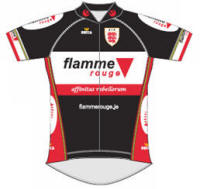Hope is Not a Strategy II
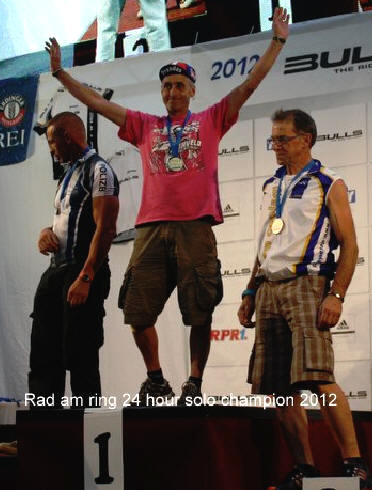
Jay Chisnall
The first non-German to win the Nurburgring 24 Hour Rad am Ring
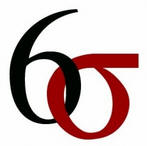 First
a recap. You'll remember from our previous
companion factsheet, that we covered a
concept called Six Sigma Training.
First
a recap. You'll remember from our previous
companion factsheet, that we covered a
concept called Six Sigma Training.
Effectively a way of eliminating, as much as humanly possible, the effects of chance and happenstance from our objectives and plans.
A champion is the person that has, better than the opposition on the day; developed their strengths, eliminated their weaknesses, mitigated their risks.
How hard can it be?
Back To The Future
Take a look back at our previous factsheet if you need to, and
remember, the level of success you will achieve is commensurate with
your commitment to the process. From start to finish; all or
nothing.
Part of the Six Sigma process is to ask "why" at every conceivable juncture. Ask "why" five times to help you get to the answer you need to transform your season from average to good, from good to great, or from podium to top step. It's all in the preparation.
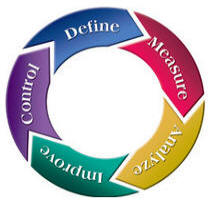 As
we stated before, being a champion is about sweating every little
detail.
As
we stated before, being a champion is about sweating every little
detail.
A championship isn't won on an individual summer's day with a couple of hours hard graft and tactical mastery.
A champion's medal is won during the many, many, days of winter toil.
In the cold, in the dark, in the rain, in the seemingly interminable days without number of sharpening the saw.
Medals are won in the winter, they just get awarded in the summer.
Read on for more clichés than you can shake a stick at and statements that when you see them written down are so annoyingly obvious! But you have to see them written down to make you consciously aware of them! That's how humans think and work.
Why People Fail...
No matter how many riders there are in your event, ten, a hundred, a
thousand, there is, in nearly all cases, just one winner.
Of the thousands that started out on the journey, most will fall by the wayside before the event even begins. Others will drop out along the way, for many and varied reasons.
Some of the more hardy will reach the base camp of actually leaving the start line. Again, the majority will be unceremoniously decanted during the course of the day's events.
As time, circumstance and the battle unfolds, many will miss the decisive break, get a "mechanical", or crack under the "perceived" pressure, be it physical or psychological.
Then there is the whittling down process of the final break, the final attack, the final sprint. From which just one will emerge, the victor.
So how can you make sure that victor is you and not someone else?
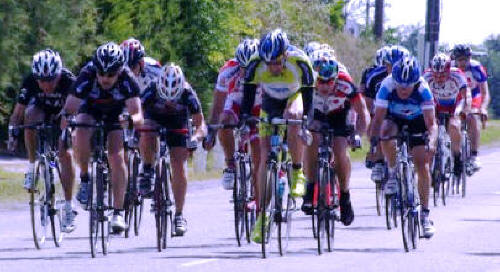
tucked in behind the windbreak waiting to pounce
as it all kicks off (too early) in the right hand gutter
Here we'll look at what stops people becoming a champion. Once you see approaching you one of the issues discussed below, just pick it up, pop it in to a metaphorical drawer and leave it there.
Or better still, give it to someone else! There's always someone looking for a reason to fail. Help them fuel their disappointment. Just don't be an ar$e about it! We'll cover the behaviour of champions a little later.
Forewarned is forearmed. With the information here you can head off at the pass any potential victory distractions that may come your way.
Understanding Fear
Fear, is a concept developed within humans, and animals,
as a default survival protection response.
Fear is a most fantastic trait, it's our first level of protection.
 The opposite of fear isn't bravery, it's stupidity! Fear often
stops us doing something stupid. Like a gazelle walking in to
a pride of lions.
The opposite of fear isn't bravery, it's stupidity! Fear often
stops us doing something stupid. Like a gazelle walking in to
a pride of lions.
However humans have another trait; ego. Ego is a (usually false) construct, stoked by the insecurities of our own identity.
Ego is how we perceive ourselves and how we would like others to perceive us.
The results are often catastrophically dichotomous, as can be found on almost any local weekend training ride!
For ego-centric riders, what they perceive to be a blistering, heroic attack off the front of the club run, is often perceived slightly differently by the mildly-indifferent chateratti.
Rule number one of our Grupetto's Rebel's Charter is, "Leave your ego at home". On our rides it won't be needed, or welcomed.
But that doesn't mean you can't think differently. Because champions most definitely think differently to the masses. They have different thoughts on their ability, their potential, their attitude to suffering and how they deal with fear. Champions don't fear, fear. They welcome it.
All champions have different thoughts; it's the great champions that keep them where they should be, in their head. They don't allow negative ones to become distracting, or destructive, actions.
Positive thoughts to the front, to be acted upon. Negative ones in a lead lined box at the back.
Suffer Well...
When the hurt begins to kick in,
if you've done a session of
Suffervals you'll know what I mean, the good athlete hangs on
and fights the suffering. The champion, suffers well; they
look for, and when they find it, they embrace and absorb the
suffering.
Another of our mantra's is that "suffering is obligatory, complaining is optional". When it hurts, force yourself to think like a champion. Expect the pain, and when it arrives, make it your friend.
Think differently, because forthcoming success begins at the edge of your comfort zone. When called for, winners always feel "uncomfortable".
Don't hide from the work and don't fear the pain. The champion is often the person who wasn't afraid to hurt themselves when it was required.
Fear is a large shadow cast by a small entity. Concentrate on the entity, don't worry about the shadow it casts. Fear, especially fear of suffering, is the first hurdle to overcome on the road to the top step.
The champion is the person that is prepared to hold their suffering for just a second more than the person next to them. Not just in the race, but in every training session undertaken in the run up to the day of reckoning.
It's all about training hard, racing easy.
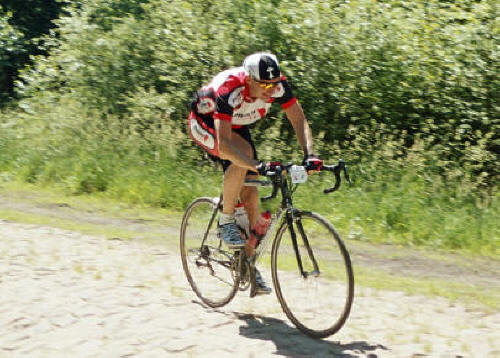
suffering well in the Arenberg Forest
Distractions...
The military have a saying that a plan never survives its first
contact with the enemy. It's the same with your training
programme. But for you the world is your enemy.
We all set out with positive and good intentions. But to become a champion, your objective has to be more than an intention. It has to be your one and only over-riding passion.
The person that's the most passionate about achieving their goal is already one step ahead of the opposition.
So when it comes to get out for that four hour endurance ride in the middle of winter and it's raining, cold, windy, no one else is going, the fence needs mending, the kids need picking up/dropping off, etc; what are you going to do?
The race-fodder rider will leave it until next week. The rider that makes the break will be the one that gets on the turbo and puts in a shift.
 The champion will be the rider that goes out, no matter what the
excuse and deals with the distractions later.
The champion will be the rider that goes out, no matter what the
excuse and deals with the distractions later.
A champion's passion for achieving their goal will always outweigh any distraction that may present itself.
Family, work, weather, "house-jobs", friends who want an easy day, and a thousand other things will at one time or another attempt to distract you from your programme.
The person who is distracted the least, maximizes their chance of standing on the top step. Remember this when you think you've found something more important than your scheduled training session.
Sometimes life will get in the way and there's no one else to pick up or drop off the kids. So be it. It has to be done.
But don't cancel your workout. Reschedule it. Because that's what your podium challengers are doing!
Last winter, I worked with a rider that has to take their children to a class at the weekend. They took their turbo and set it up in the car park to bang out a session while waiting for their child to return. People often stopped and incredulously stared.
People also stopped and stared when a champions medal was picked up in the summer. Did those ten turbo sessions make a difference? Who knows? But they sure helped a whole lot more than sitting in the car for an hour, reading a paper and listening to the radio.
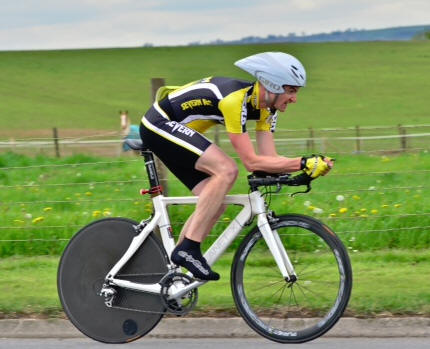
Andrew Derrick ~ TTing to another season's PB...
Cover The Bases
Champions leave nothing to chance. Nothing! They do
their homework, they do their research and they do their testing.
To set your training objectives you need to find out and understand the targets for your chosen event. Look at what it takes to win; average speed, winning times over the last five years, average power required, VAM for the last climb, etc.
Next, is to test yourself, over the same "critical" time period, power output, sustainable speed, climbing ability, etc, to find out where you are at this moment in time.
If your objective is a TT or track event, then it's as simple as entering the details of where you now are, and where you need to be, in to our free TT Strategies Document, and hey presto!
It'll even tell you what gear, at what cadence, and what pace you need to ride to enable you to hit your target.
Armed with this information, your job is to prepare or find a suitable training programme that will, a couple of weeks before your objective, close the gap between where you now are and where you need to be.
Just ensure you slip in a few, sub-goal, test events during the interim to keep you on track.
There's no pixie dust, no smoke and mirrors; it really is as simple as that.
For road racers, sportive riders, mountain bikers or any sort of "massed start" event, the Ability Gap Analysis (AGA) document is probably more suitable for your needs.
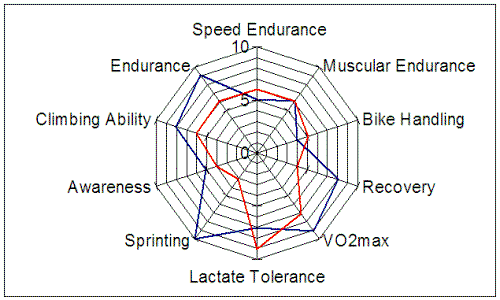
The flamme rouge AGA, is another tool we use to narrow down and isolate "under developed strengths". Our riders don't have weaknesses!
Spending fifteen minutes to complete an ability gap analysis will very quickly identify what you need to do and where best to concentrate your training investment.
Champions don't waste time doing what they like or practicing what they are good at. They work on areas they need to develop.
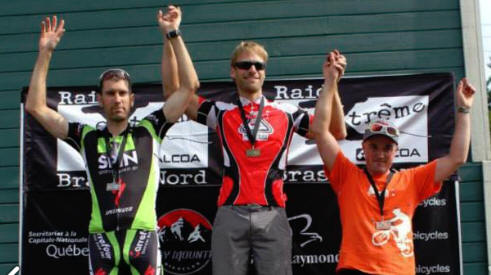
Alain Gagnon ~ 2013 Canadian MTB Extreme Champioon
No Regrets...
Never be afraid to fail. Failure is only a failure if you
never try. The only thing you should be afraid of is having to
say the words "if only".
If only I'd gone with the break; if only I'd trained harder in the winter; if only I'd carried on with the sprint training that made me throw up.
This is the only thing you should be afraid of. Everything else is just a distraction. Everything else can be overcome, ignored or mitigated.
"If only", is the saddest, most useless, phrase in the English language. Its very nature suggests you were presented with an opportunity you chose not to take.
If only, suggests there was an option. If only, suggests there was an element of fear or doubt in your reasoning. Don't ever put yourself in a position where you have to say or ask, "if only.."
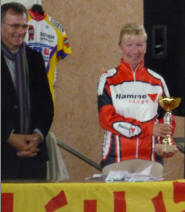 To see how it feels to have this thought, just look at that podium
pictures directly above and at the very top of this article.
To see how it feels to have this thought, just look at that podium
pictures directly above and at the very top of this article.
Compare and contrast the despair on the faces of the riders standing either side of Campiones Chisnall and Gagnon.
Close, but no cigar. Don't let that be you.
Now compare their faces to those of the boys on the top step. And to that of my wife picking up her prize for the second year in succession, as first lady, in the Marc Gomez (Milan San Remo winner) sportive...
Experience ~ Get it Quickly
You've probably heard the term "an old head on young shoulders".
This often relates to someone who is "cool under pressure".
Experience allows you to "filter" what information you take in. Experience allows you to immediately match what you see or feel against a pre-set template and process accordingly.
Only relevant information is allowed to pass to the decision making part of the brain. Information flow is slowed down to manageable levels.
These templates become instinct. They don't require a thought or decision process, so action is immediate. Once the body is in action mode the mind stops interfering.
It's often the case that we think about things after they happened. Like sprinting for a gap that might not yet be there. If we thought about what might happen before we act, we wouldn't of done it!
You don't see the champions chasing every single break that goes up the road. But you rarely see them miss "the one" that defines the outcome. This is no accident. It's no accident that the same riders year in, year out, win the combativity awards for being in the most breaks.
You never (normally) see champions at the back of a group, eating or faffing about approaching a climb or a key moment of the race. But then again, champions don't wait for key moments of a race.
They make them...
300 metres of genius ~ 50 kilometres of panic
summed up in six minutes
There's a saying in cycling, "If you have to think about it, it's too late". Your job, to become a champion, is to act on the important stuff, ignore the irrelevant stuff and as quickly as you can, learn the difference between the two.
Because there are loads of riders out there with the physiological attributes to become champions. But their "nerves" or decision making skills will, until brought under control, always prevent them from standing on that elusive and exclusive top step.
We cover Thinking Under Pressure in a separate factsheet, as it's too big a subject to be included in this one! But the difference clarity of thought can make to your season is huge!
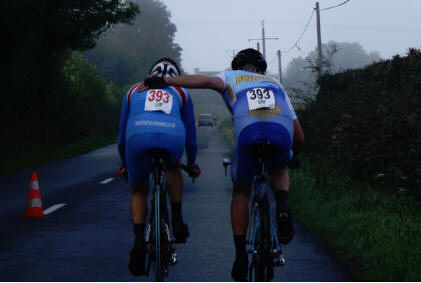
Jay Chisnall again ~ 2013 Duo Normand
Helping his sick mate to the finish. This is what champions
do...
Champion's Traits
I've said this before, and I'll say it again; many times! In
my opinion, there's more to being a champion than being the fastest
rider.
A champion should have humility in their actions and a respect for the riders they've defeated. A champion should have a personality that reflects their standing. A champion should be looked up to by those around them. Not all, are.
I'm sure you all know a champion that you find hard to respect. They do exist. But when their powers wane, what do they have left? A medal in a drawer or a trophy on a shelf. Respect never diminishes.
When you win, take pride in your achievements. You've earned the right to be proud. Just remember, there are riders now trying to take what you have away from you. Now you're a champion you have to work harder and smarter to keep what you've got.
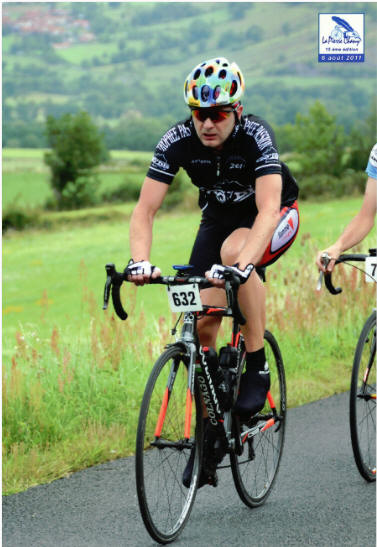
the coveted maillot noir
Trophee Passion Championship Leader
The Message
Things worth doing take time and patience and practice to achieve.
All riders work hard, we all do. But do we all have what it takes?
Can we find that extra 5% to stand on the podium?
And are we prepared to put in that extra 80% of effort for the 20% reward in performance to take us from the podium to the top step?
If you want something you've never had, you're going to have to do something you've never done. You can't keep doing the same thing and expect different results. It will never happen. Many have tried.
Remove as much static, white noise and distractions from your life as you can. Distance yourself from negative people, negative thoughts and negative emotions.
Not everyone wants to be champion. And not everyone is willing to, or can, make the sacrifices required.
Not everyone can be a champion. This is nothing to beat yourself up about. Without someone to beat, a champion has no victory, no glory, no ego. It doesn't mean we should make it easy for them though.
Because if the gregario's work hard, prepare to be the best they can be, on a good day they can take advantage of any slip-ups or misfortune that may hamper the favourites.
However, you must never say about a champion that "they got lucky". Champions are rarely "lucky". They have luck, but they were there to grab the opportunity when it presented itself.
So work hard, cover as many bases as you can to eliminate weaknesses and risk, learn to suffer just a little bit more than the others, ignore all distractions and be nice to those that are trying to beat you. If you can do all this with clarity of thought, you're as good as there.
There are three types of people in the world; those that, let things happen, those that make things happen and those that say "what happened?" Guess which group the champion belongs to?
Until next time...

